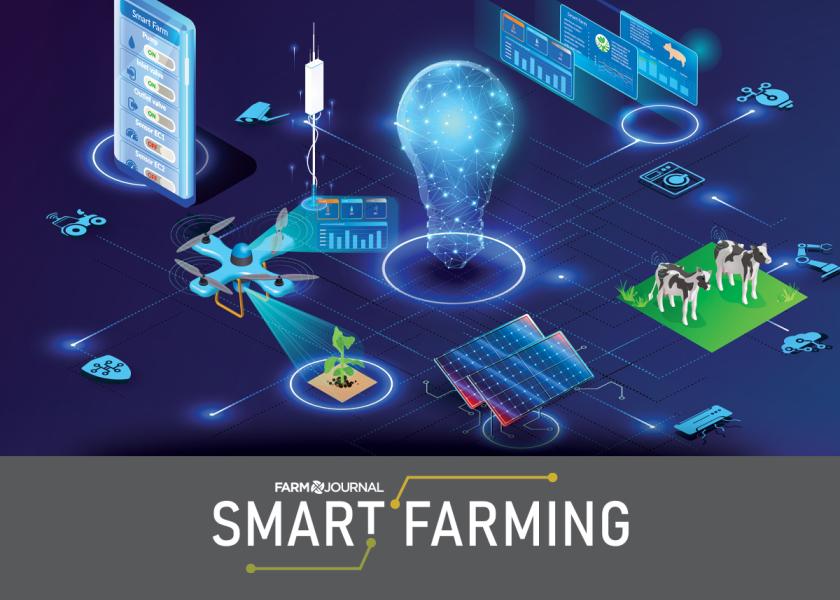ISO Defines Smart Farming, Details Benefits In Special Report

The data revolution is underway in agriculture, writes the International Organization for Standardization (ISO) in a 2023 report titled "Smart Farming: the transformative potential of data-driven agriculture".
Smart farming and precision agriculture leverage technologies like agricultural drones, robotics, IoT sensors, GPS and farm management information systems to improve production efficiency. These technologies – also known as digital agriculture – are crucial as we strive to feed a growing global population while safeguarding our natural resources and ecosystems. They help to empower farmers to make informed decisions, optimize resource use and enhance productivity.
Through smart farming, we can better adapt to the uncertainties brought by climate change, mitigate environmental impacts and promote resilience in agricultural production. It enables us to produce more with less. This not only ensures food security but also contributes to a healthier planet.
What is smart farming?
Smart farming refers to using modern information communication technology (ICT) and data analytics in agriculture. If done right, it will optimize and increase the efficiency of food production – improving sustainability and therefore supporting biodiversity and planetary renewal – and help eliminate food waste.
A recent ISO report defines smart farming as “a data-driven, principled decision making in agricultural and food value chains occurring as multi-objective optimization in the context of global volatility, uncertainty, complexity and ambiguity”.
Built around advanced technologies, such as agricultural drones, robotics and IoT sensors, smart farming offers a global vision of modern agriculture. It seamlessly connects the entire food value chain, linking systems through standardized data formats. Smart farming is data-driven, efficient and sustainable digital agriculture.
Heightened connectivity unlocks the potential of precision practices such as variable rate fertilizer application, soil monitoring, yield mapping and livestock monitoring. Smart farming technologies collect data about crops, soil conditions, weather patterns, and more. The data is then analyzed to inform decisions that lead to more efficient use of resources like water, fertilizers and crop protection agents. This efficiency maximizes output while minimizing waste.
Data-driven insights
Smart farming leverages standardized data formats. This allows different systems to “talk” to each other and share information. Data can flow smoothly from agricultural sensors, farm equipment and inputs to production, processing, retail and consumers.
To reduce barriers to use, data must be “FAIR”, that is, Findable, Accessible, Interoperable and Reusable. International Standards play a vital role in developing frameworks and protocols for universal data sharing.
Interoperable data enables capabilities like:
- Shared information and measurements from the field
- Integrated pest management across regions
- Decision support tools drawing on diverse data pools
- Easy transfer of data along the supply chain
Benefits of smart farming
Smart farming transforms traditional agricultural practices into data-driven, efficient and sustainable systems that address current challenges while laying the groundwork for a more secure and prosperous future in agriculture.
Data analytics can empower farmers in many ways:
- Targeted crop advice, financial services and risk management tools
- More efficient use of seed, fertilizer and water
- Early identification of plant stresses, soil issues and pests
- Market insights for reduced crop waste and loss
- Regulatory compliance of farming operations
- Easy exchange of information with partners
Standards-based data exchange has the potential to boost efficiency across the supply chain and drive towards a net-zero and farmer-resilient future. It can connect them to markets, weather insights, diagnostics tools and other helpful services through basic mobile devices.
Realizing the potential
Progress is being made. Precision farm equipment, together with fleet management and data analytics, are increasingly being used to realize the full promise of smart farming. With a commitment to robust data standards, smart farming can leverage technology to build sustainable food systems.
Smart farming is a powerful tool in the collective efforts to transform food systems and build a world where no one goes hungry and where agriculture contributes to a more resilient and sustainable future.
Head over to ISO.org to read the full report and download ISO's 175-page Strategic Advisory Group Smart Farming report via the link at the bottom of the article.







